
Scyliorhinus is a genus of catsharks in the family Scyliorhinidae. This genus is known in the fossil records from the Cretaceous period, late Albian age to the Pliocene epoch.
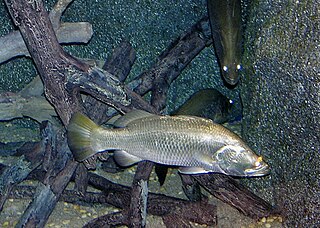
Lates is a genus of freshwater and euryhaline lates perches belonging to the family Latidae. The generic name is also used as a common name, lates, for many of the species.
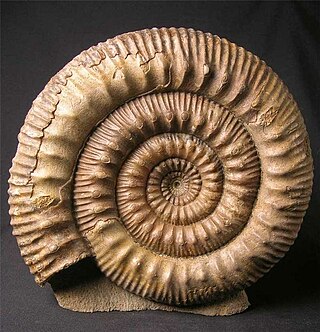
Stephanoceras is an extinct genus of Stephanoceratoid ammonite which lived during the Bajocian. It is the type genus of the family Stephanoceratidae.

The Palaeonisciformes, commonly known as "palaeoniscoids" are an extinct grouping of primitive ray-finned fish (Actinopterygii), spanning from the Silurian/Devonian to the Cretaceous. They are generally considered paraphyletic, but their exact relationships to living ray-finned fish are uncertain. While some and perhaps most palaeoniscoids likely belong to the stem-group of Actinopteryii, it has been suggested that some may belong to the crown group, with some of these possibly related to Cladistia and/or Chondrostei. Many palaeoniscoids share a conservative body shape and a similar arrangement of skull bones.

Aetobatus is a genus of eagle rays native to the Atlantic, Pacific and Indian Oceans. It was formerly placed in Myliobatidae, but is now placed in its own family Aetobatidae based on salient differences from myliobatids, especially the pectoral fins joining the head at the level of the eyes.
Procerites is an extinct genus from a well-known class of fossil cephalopods, the ammonites. It lived during the Jurassic Period.
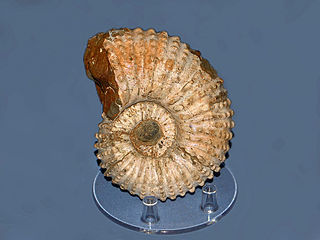
Douvilleiceras is a genus of ammonites from the Middle to Late Cretaceous. Its fossils have been found worldwide, in Africa, Asia, Europe, and North and South America.
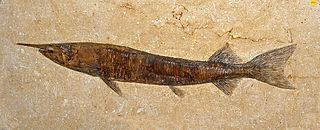
Vinctifer is an extinct genus of prehistoric bony fish erected by David Starr Jordan in 1919.

Euthynotus is an extinct genus of prehistoric bony fish that lived during the early Toarcian stage of the Early Jurassic epoch. It is generally considered the basalmost pachycormiform.

Paralepidotus is an extinct genus of prehistoric ray-finned fish.

Clypeaster, common name "cake urchins" or "sea biscuits", is a genus of echinoderms belonging to the family Clypeasteridae.
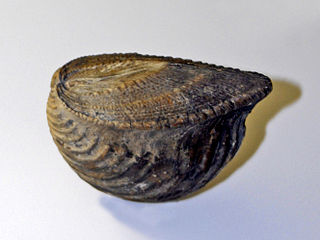
Trigonia is an extinct genus of saltwater clams, fossil marine bivalve mollusk in the family Trigoniidae. The fossil range of the genus spans the Paleozoic, Mesozoic and Paleocene of the Cenozoic, from 298 to 56 Ma.
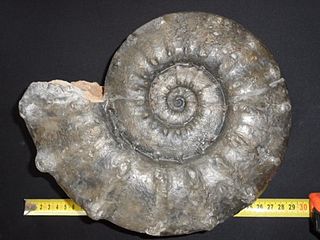
Euaspidoceras is an extinct ammonoid cephalopod genus that lived during the Middle Jurassic.

Pterotrigonia is an extinct genus of saltwater clams, marine bivalve molluscs in the family Megatrigoniidae. This genus is known in the fossil record from the Jurassic period Tithonian age to the Cretaceous period Maastrichtian age. Species in this genus were facultatively mobile infaunal suspension feeders. The type species of the genus is Pterotrigonia cristata.

Baluchicardia is an extinct genus of fossil saltwater clams, marine bivalve molluscs in the family Carditidae. These clams were facultatively mobile infaunal suspension feeders.

Reineckeia is an extinct genus of ammonoid cephalopods belonging to the family Reineckeiidae.

Euaspidoceras perarmatum is an extinct ammonoid cephalopod species that lived during the Jurassic.

Eotetragonites is an extinct genus of ammonite.

Purpuroidea is an extinct genus of sea snails, marine gastropod molluscs in the clade Littorinimorpha.

Clypeidae is a family of sea urchins belonging to the order Clypeasteroida.



















